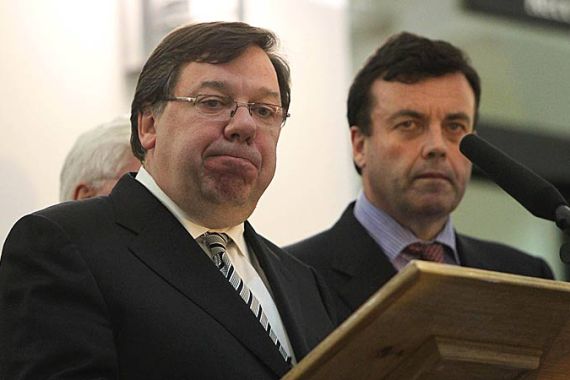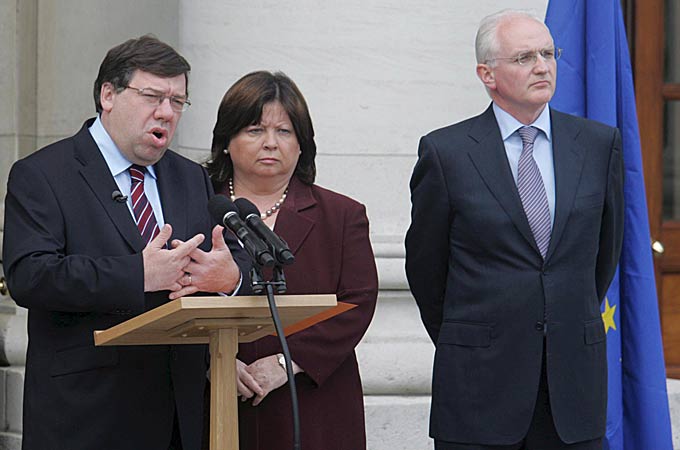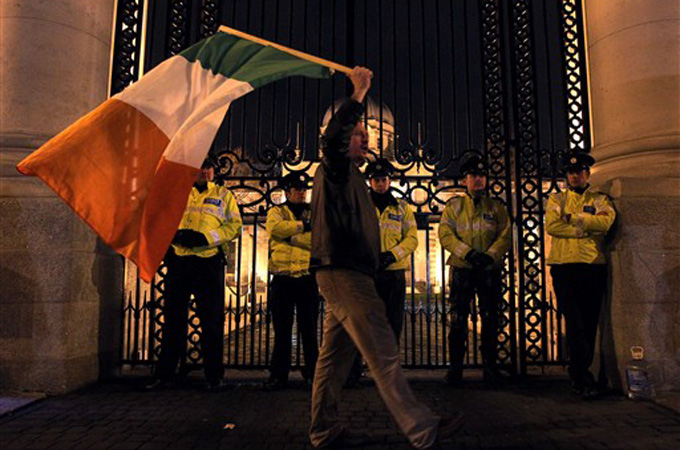Irish election set for early 2011
Prime minister to seek early dissolution of parliament in new year after country’s emergency budget has been passed.

 |
| Cowen has resisted pressure to resign immediately, saying it would delay the budget and bailout negotiations[EPA] |
Brian Cowen, the Irish prime minister, has said he will call an early national election next year after the parliament passes a crucial budget at the centre of an international bailout of up to $124bn from the IMF and EU.
Speaking at a news conference in Dublin on Monday, Cowen said he would call an election once the budget is fully passed but declined to specify any date.
Keep reading
list of 4 itemsWhen will EVs become mainstream in the US?
Key takeaways from Xi Jinping’s European tour to France, Serbia and Hungary
Air Vanuatu goes into liquidation, thousands of passengers stranded
“It is my intention at the conclusion of the budgetary process, with the enactment of the necessary legislation in the new year, to then seek the dissolution of parliament,” he said.
The announcement came after the Green Party, Cowen’s coalition partner, said it would quit government and demand a snap election to provide “political certainty” after Ireland accepted the multi-billion dollar bailout on Sunday.
Cowen resisted pressure from the Greens and even some legislators in his own Fianna Fail party to resign immediately, saying he couldn’t quit now because that would delay the 2011 budget and the bailout negotiations.
The government is to publish a four-year budget plan on Wednesday to show how it will balance its books ahead of the budget for 2011, which is expected on December 7.
Cowen said: “There are occasions when the imperative of serving the national interest transcends other concerns including party political and personal concerns, and this is one such occasion.
“It is a matter then of highest importance that Dail Eireann [the parliament] should continue to consider and enact the relevant measures and that the government should continue to discharge its obligation to bring forward the necessary proposals.”
‘Misled and betrayed’
Earlier on Monday, John Gormley, the leader of the Greens, said the Irish people felt “misled and betrayed” after Cowen finally bowed to foreign pressure and agreed to the bailout.
Ireland’s $20.5bn of austerity measures, which will be rolled out over four years, are set to involve public spending cuts and tax rises.
The government is expected to cut the minimum wage, slash social welfare spending, reduce the number of public employees and include a new property tax and higher income taxes.
But it will keep its ultra-low 12.5 per cent corporate tax rate – a magnet for foreign investment but an irritant to many EU partners, which see it as a form of unfair competition.
Gormley indicated that his party would still support the budget measures and said that they were needed, along with the bailout, to “safeguard the future prosperity and independence of the Irish people”.
“Leaving the country without a government while these matters are unresolved would be very damaging and would breach our duty of care,” he said.
“But we have now reached a point where the Irish people need political certainty to take them beyond the coming two months.
“So, we believe it is time to fix a date for a general election in the second half of January 2011.
‘Cutting and running’
The opposition Sinn Fein party, a small force in the Republic of Ireland which had already called for an immediate general election, accused the Greens of “cutting and running”.
 |
| Protests were held outside the prime minister’s office in Dublin [AFP] |
“Today’s announcement means that the Greens are to cut and run – to help Fianna Fail to impose savage budget cuts, to put the state in the hands of the IMF and then run for their political lives,” Caoimhghin O Caolain, Sinn Fein’s leader, said.
Defending the bailout, Gormley said that since entering the government in June 2007, his party had helped to “fix and reform the economy”, in particular to shore up the debt-ridden banks.
“However, it is now clear we need further measures to give market confidence about our banks and public finances,” he said.
“Despite our difficulties and disappointments, I believe we can get out of this situation. We must all work together to ensure the best outcome for everyone.”
Irish anger
The news of the bailout has sparked anger within Ireland, where many people feel “humiliated” by the move.
“It’a humiliation for the Irish population and it’s a big humiliation for the Irish government as well,” Rory Challands, Al Jazeera’s correspondent in Dublin, said.
“[The government] has been saying for weeks that it didn’t need any aid and now it has turned around and said yes it does need it.”
John Walsh, the editor of Ireland’s Business and Finance magazine, told Al Jazeera that Ireland will have to pay “a very, very high political price” for the crisis.
“A lot of people are blaming the euro for this but much of the problem has to do with domestic policies.
“We joined the euro and we probably did have artificially-low interest rates during a period of unprecedented economic expansion,” he said.
“On the other hand there were fiscal levers we could have pulled to dampen that enthusiasm, to dampen some of that growth.”
But the government did the complete opposite, Walsh said, which resulted in the economy going into overdrive – meaning it was always going to become overheated.
“A big component of that was the banking system, where the banks grew far too big for the size of the economy. Now they have collapsed and left the country in economic ruin.”
Sunday’s announcement came after a series of conference calls among European partners and G7 counterparts from the US, Japan and Canada, amid pressure to plug a giant hole that has already seen the Irish government pump $70bn into its failed banks.
Further weeks of negotiations are expected to define the fund’s terms, conditions and precise size.